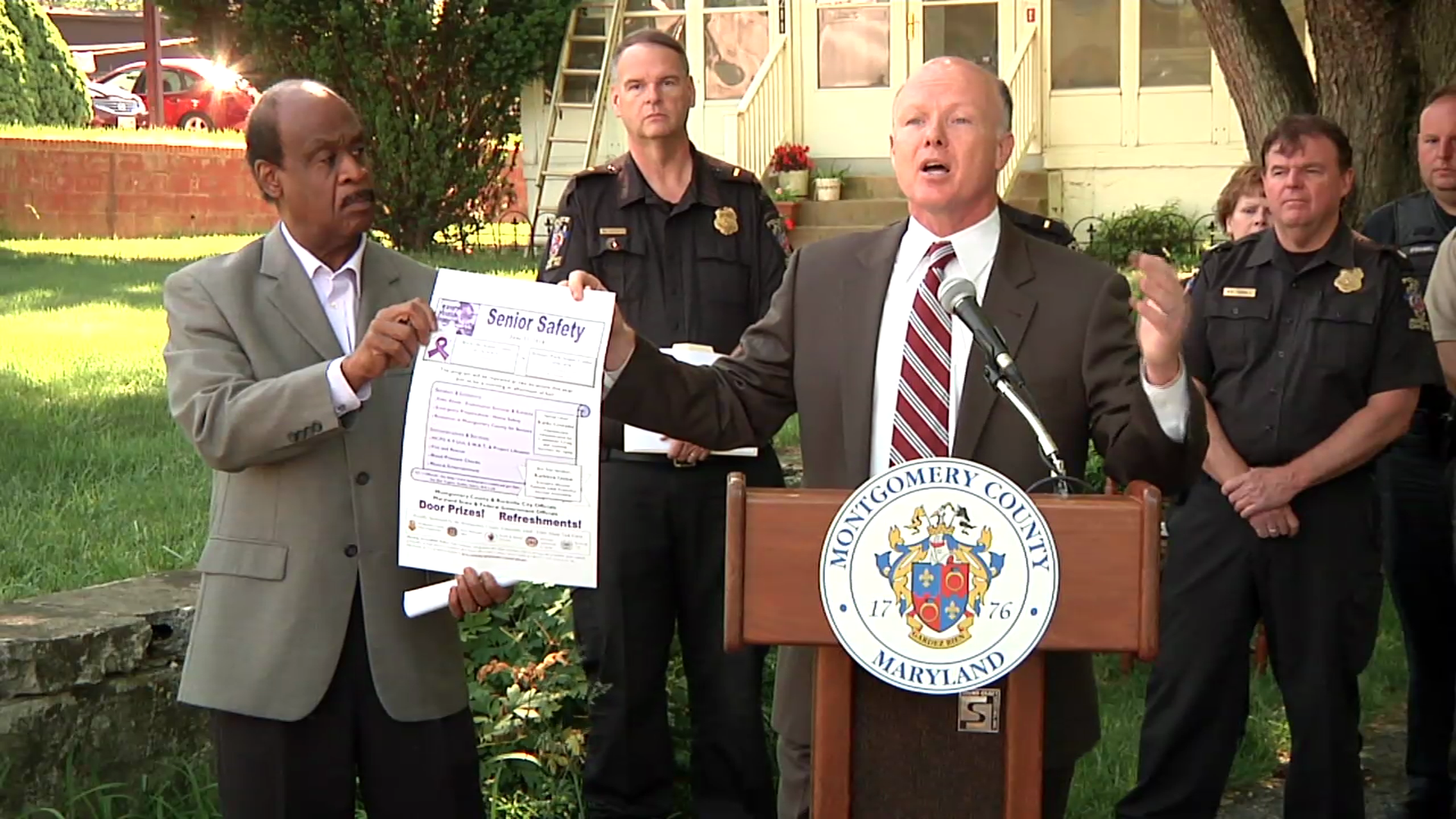
County Cracking Down on Unlicensed Home Improvement Contractors (Video)
Montgomery County Executive Isiah Leggett has announced a collaborative effort between the Montgomery County Police, the Office of Consumer Protection, the State’s Attorney’s Office, the Maryland Home Improvement Commission, the Department of Natural Resources and the police departments of neighboring jurisdictions to crack down on unlicensed home improvement contractors.
Law enforcement agencies in the region will share information and work cooperatively to file criminal charges against these individuals who have victimized homeowners, stealing millions of dollars.
Speaking at the home of a Rockville resident who was victimized by an individual who knocked on her door and offered to cut some tree branches, Leggett expressed confidence that this collaboration will result in even more arrests and convictions.
“Vulnerable homeowners – especially seniors – need to be vigilant when hiring a contractor,” said Leggett. “These illegal and unscrupulous merchants seek to take advantage of consumers, especially during the warm weather months and after every storm.
“Our message is simple: if you try to rip off our residents, we will track you down and prosecute you to the fullest extent of the law.”
“During one investigation I started off with a single scam victim, but later found 80 more victims of the same suspect,” said Montgomery County Police Lieutenant Michael Hartnett. “There are more than 300 unlicensed tree cutters, also known as ‘woodchucks,’ who have been identified by law enforcement and new ones continue to show up.”
Law enforcement personnel from multiple jurisdictions are sharing information regarding unscrupulous contractors who are defrauding homeowners in Montgomery County and surrounding areas. These unlicensed contractors typically victimize consumers by going door-to-door soliciting payment in exchange for making repairs. Repairs usually involve roofs, driveways or damaged trees. However, in many cases, after being paid unconscionably high fees, the “contractors” may leave without making any repairs or only engage in shoddy work. Many of the unlicensed contractors come from out-of-state and may have criminal records.
“Don’t be fooled by an unlicensed contractor who offers to do a job at a lower price than a licensed contractor,” cautioned Maryland Department of Labor, Licensing and Regulation Secretary Leonard Howie. “It may seem like a great deal at first, but it may cost much more money in the end to repair shoddy work or to pay another contractor to complete the work if the unlicensed contractor takes your money and never returns.”
Montgomery County Police, Financial Crimes Section, offers homeowners the following warning signs:
· Contractors going door-to-door soliciting home improvement work;
· Contractors driving vehicles with out-of-state license plates and without a business name and license number printed on the vehicle; and
· Contractors who offer to drive a consumer to the bank or ATM in order to receive payment.
The Office of Consumer Protection urges consumers to follow these steps before entering a contract for any home improvement work:
Do not panic and hire someone because they are the only company that can come out to the house right away. Make sure the home improvement contractor is licensed with the Maryland Home Improvement Commission (MHIC) by calling 410.230.6309 or check online. Also, make sure the contractor is familiar with and has expertise in repairing the type of damage that your house has sustained, such as roofing or foundation repair.
For tree service or removal, check to see if the business is a licensed tree expert with the Maryland Department of Natural Resources (DNR), Forestry Division, at 410.260.8521 or online at www.dnr.maryland.gov. If a licensed company is used, there is a complaint process through the Department of Natural Resources. If an unlicensed company is used, it is often impossible to track down the company, particularly if they have been paid in advance. In addition, consumers should ask to see written verification of the company’s insurance and workers compensation coverage.
Get estimates from three contractors. Some fraudulent contractors will capitalize on the situation and overcharge consumers or lead them to believe the damage is worse than it really is. State law requires a written contract for any work completed. A home improvement contract should include the terms and conditions of the warranty. The manufacturer’s warranty should be a separate, written document. The contract must also include: the contractor’s name, address and home improvement license number; the approximate starting and finishing dates; and a description of the work to be done and materials to be used.
State law prohibits home improvement contractors from collecting more than one-third of the contract amount as a deposit. If the contract is signed in your home, the contract must allow the consumer three days in which to cancel. Under emergency situations only, the consumer may waive this three-day right to cancel, but must sign a special form to do so.
Check the contractors’ complaint records with the Office of Consumer Protection at 240.777.3636 or online at www.montgomerycountymd.gov/consumer and the Better Business Bureau at 202.393.8000 or online at www.dc.bbb.org, and with the MHIC and DNR.
OCP, the County’s consumer protection agency, investigates thousands of complaints each year involving automotive sales and repairs, new home purchases, home improvements, credit issues, retail sales, internet services and most other consumer transactions. OCP provides pre-purchase information to consumers, as well as speakers to the community on consumer issues.
For more information, call 240.777.3636 or visit OCP’s website at www.montgomerycountymd.gov/consumer.

Engage us on Facebook
Follow us on Twitter
Tweets by @mymcmedia